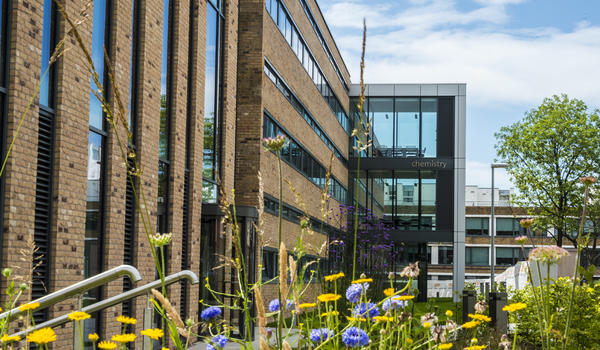Traditional route PhD - independent study
We offer supervision in a range of research areas by world-renowned specialists in a range of topics within our areas of specialism.
With a long history of research and research supervision and a very large number of PhDs awarded as well as a thriving and friendly research community, students enrolled via the Educational Research (Independent Study) route are able to participate in research seminars, postgraduate group meetings and in the research and evaluation projects led by our academics, when available. We consistently achieve very high ratings from our postgraduate students on the level of satisfaction with the quality of supervision they receive. Our postgraduate research students feel part of the life of the Department as well as a contributing member of a community of researchers.
Postgraduate students are supported through regular supervision. Supervision for research degrees (MPhil or PhD) on either a full-time or part-time basis is available in all of the areas of expertise offered by staff in the Department.
Applications for research into language teaching, learning and assessment, including English as a Foreign Language (EFL) and English as a Second Language (ESL), are best directed to Lancaster University's Department of Linguistics and English Language where there is considerable expertise in these areas.
Key information
Accordion
-
Independent Study
For some students, it can be unclear what studying for a PhD involves.
By "Independent Study Mode" we mean studying a PhD by supervision, with a single supervisor advising and overseeing your work.
There are no courses involved and no requirement to attend at specified times: you and your supervisor determine together when you will meet, and whether you will always meet face-to-face, or in addition use telephone, Skype or other technology to discuss your work. You may, however, need to undertake research training modules or English-language tuition, depending on your needs.
So, when you register and arrive at Lancaster, you will meet your supervisor and the Postgraduate Research Students’ Administrator, as well as meeting other PhD students and other staff in the Department.
It is possible, also, to study for a traditional route PhD part-time at a distance from Lancaster.
The Director of the Doctoral Programme for Traditional Route Research students will also meet you and explain some of the key information you need to know about studying for a PhD in the Department of Educational Research.
-
Programme features
- The Department has a set of expectations of progress, and each year in June, you will be appraised on your progress by academic members of the department other than your supervisor.
- In the second year of your PhD you will prepare for the "confirmation" process, that is, submission of a document up to 5,000 words and a panel interview; your progress is checked to ensure that you are operating at PhD standard. This process leads to the ‘confirmation’ of working at PhD level.
- The Department ensures that postgraduate research students are fully involved with the Department and opportunities include: participating in research seminar programme on Wednesdays; having a "work in progress conference" for all PhD students in June where they talk about their research; and a research students’ group which meets regularly and is convened by the Director of the Doctoral Programme for Traditional Route Research students.
-
Research
The key thing about undertaking a PhD by the traditional route in the UK is that you are an independent researcher, not a doctoral programme course member. You are assisted by your supervisor, whom you will meet at regular intervals, but the responsibility is yours.
Your task is to create an 80,000 word thesis based on your research which is an original contribution to knowledge. Two examiners will assess this, and you will undertake an oral examination (a viva voce) when you have completed your thesis after three years of full-time research (or part-time equivalent).
“A successful candidate for the degree of PhD shall show convincing evidence of the capacity to pursue scholarly research or scholarship in his or her field of study on a scale which should be completed during three years of full-time research. The results of this research shall then be embodied in a thesis which makes an original contribution to knowledge and the completed thesis must contain material of a standard appropriate for scholarly publication.” Extract from Lancaster University Regulations (MARP).
How to Apply
How to apply
The name of this programme in the application system is Educational Research (Independent Study) PhD. Please ensure that you apply for that programme in the application system.
Please visit the Applying for postgraduate study page for more information on how to apply for a place.
Alternatively, application forms can be obtained from Postgraduate Admissions:Telephone: +44 (0)1524 510880Fax: +44 (0)1524 510857E-mail: fass-pg-admissions@lancaster.ac.uk
Overseas applicants may be required to have a telephone interview, with either the Director of the Doctoral Programme for Traditional Route Research students or the potential supervisor, in order to discuss their submitted application.
Entry requirements
For admission to this version of the programme applicants should normally have:
- a good honours degree from a British university or CNAA, and a good taught Master's degree; or
- qualifications of a comparable standard from a university or recognised degree awarding body in another country.
- IELTS: Overall 6.5 with at least 6.0 for reading and writing and 5.5 for speaking and listening.
All applications for postgraduate research must be supported by a written proposal (see "What to include" section for details). This will give us a clear idea of your interests, will help us assess your ability to successfully complete a PhD and will help us to identify an appropriate supervisor for you. You should give a clear, academically sound, description of the area that you want to work in and the type of research that you are interested in undertaking, indicating which supervisor(s) are likely to match your research interests, after reading the individual profiles of the academic staff. We recognise that this may change later, as you begin the research and read more about the field.
What to include
Guidelines on writing a postgraduate research proposal
Your proposal should be between 1500 and 2000 words in length, excluding the bibliography. Please write under the following headings. Proposals in other formats will be returned for amendment.
Title
Give your proposal a meaningful, provisional title that summarises your area of interest and your planned programme of study.
Research question(s)
Identify the main research question(s) that you will be asking. These should be succinct, researchable and significant. Bullet points are usually best.
Background
Explain how your questions are different from those asked by others, drawing on a brief review of the relevant research literature. You should show that you are familiar with the main literature in the field you are interested in.
Theoretical Framework
Explain the core concepts that will underpin your research, drawing as necessary on prior theories, reviews of the literature, policy discussion or your own experiences. Set out what the concepts mean, how they relate to each other, and how they will influence your research: considering the design, data collection, analysis and reporting of your research as appropriate.
Research Design & Methods
Please describe the research design of your study, including the who, what, where and why of your research plan. Briefly describe the method(s) that you will use to answer your research questions (such as library based, conceptual or empirical methods). Show why this is an appropriate design to answer your research questions.
Significance of your Research
Describe the contribution that you consider this research will make. Identify the implications of your research for existing educational knowledge, theories, policy or practice. Try to say what difference your research could make to any of these.
Alignment with Department
Please indicate how your proposed work will align with one or more of the Department’s three research centres—where possible identifying how your work fits particular centre research themes. Each department research centre has a set of research themes: see the websites of the Centre for Higher Education Research and Evaluation, the Centre for Social Justice and Wellbeing in Education, and the Centre for Technology Enhanced Learning for more information. Explain how your project will contribute to the priorities identified under the theme heading, and where possible how your work will benefit from work already going on in the centre. Your work can be aligned with only one research centre, or several, but please explain the points of alignment in words rather than providing a list of themes.
Timetable
Please include a detailed timetable that shows how the research design can be managed within a three year time period (or a 5 year period for part time students). You should explain what you will be doing during your period of registration to progress the research.
Bibliography
List some of the main written sources on which your research will be based.
When to apply
You can apply to begin your research degree in October or January, but it is preferable to start in October if you can, as it is easier for you to find accommodation and to attend the Research Training Programme support courses offered by the Faculty of Arts and Social Sciences (FASS) in a sensible order.
Fees and funding
The University's postgraduate pages contain up-to-date information about current Research Fees. The relevant fee scale is listed as Educational Research (Independent study).
Please note that applicants to the Traditional Route PhD in Educational Research are not eligible for Faculty Postgraduate Scholarships.
To help finance your postgraduate study at Lancaster, you can apply for funding from charities and other funders: further details are available on the Fees & Funding webpage.
Economic and Social Research Council (ESRC) Studentships
Applications for research study are invited by the Department of Educational Research for ESRC Doctoral Training Awards, funded through the North West Social Science Doctoral Training Partnership (NWSSDTP).
These awards are an excellent opportunity for prospective PhD candidates to gain the funding to participate in leading education research institutions (full-time or part-time) as +3 PhD (Lancaster), 1+3 PhD (Manchester and Lancaster). Candidates must have submitted an admissions application to the Department in advance of their NWSSDTP application. The award covers the tuition fee, a maintenance grant, and a training support grant. Applications are invited in any of the main areas of Research in the Department.
Please view the NWSSDTP how to apply pages for further details.
Please send completed NWSSDTP applications, transcripts and references to FASS PG admissions. Studentships start each October with an entry deadline in early February.
PhD Supervisors
-
Click to expand list
- D
- E
- F
- G
- I
- N
- O
- Q
- R
- U
- X
- Y
- Z
Loading People
Contact us
Director of the Doctoral Programme for Traditional Route Research students: Dr Richard Budd
E-mail: r.budd@lancaster.ac.uk
Traditional Route PhD Co-ordinator: Alison Sedgwick
E-mail: a.sedgwick@lancaster.ac.uk
Tel: +44 (0) 1524 592685
























